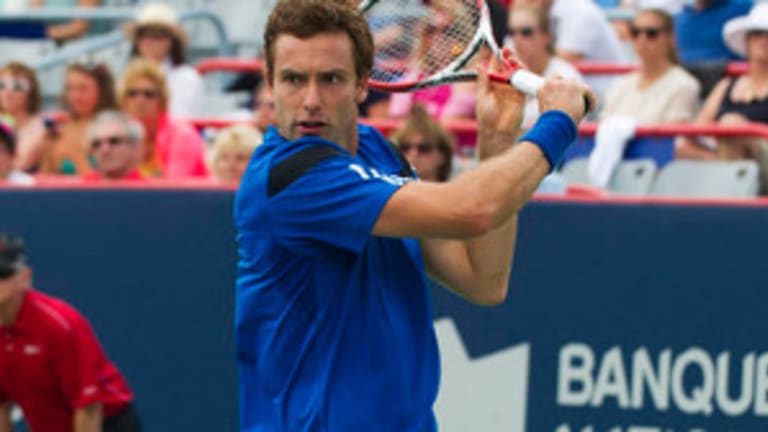Each day this week, Peter Bodo will review action from the Rogers Cup tournaments in Canada and preview upcoming matches. These "Good Morning Canada" posts will be published around 10 am EST, and we encourage you to discuss the day's play—along with Pete's thoughts—in the comment section below.
Yesterday: In the past few years, John Isner has been frequently spoken of as the young man who would help lead a long-awaited resurgence in U.S. tennis. Yesterday, he became the unwilling answer to a painfully embarrassing trivia question among his countrymen.
By losing to Canadian wild card Vasek Pospisil in the Rogers Cup, Isner will fall out of the Top 20 when the next rankings are released on Monday. It will be the first time in the history of the ATP rankings (which commenced in 1973) that no American male is in the Top 20.
It was a doubly painful blow because, before Isner ran into the 23-year-old from Vancouver (one of five inspired Canadian men who have battled through into the second round), he was actually playing some wonderful tennis. He’d won 11 of his last 14 matches (with the title in Atlanta his major prize) and this looked a lot like win No. 12 of 15 until very close to the end.
Isner won the first set but lost control of the second-set tiebreaker. He built a 4-2 lead in the third set, only to see Pospisil find the range with his service returns and groundstrokes. Yet even after Pospisil broke back, Isner would go on to lead in the final-set tiebreaker by 4-2, and his record this year in tiebreakers has been superb (28-9). It didn’t help much. The memorable—and emblematic—point was at 4-all, when Pospisil stretched way over to crunch an forehand service return to Isner’s shoetops.
The startling thing is that Isner lost despite an outstanding 70 percent first-serve conversion that stood in stark contrast to Pospisil’s anemic 54 percent.
Overall, though, it was Canada day all over again in Montreal. Flagbearer Milos Raonic, the No. 11 seed, sputtered a bit but finally downed Jeremy Chardy in straight sets; No. 169 Frank Dancevic nailed down his first main-tour match win of 2013 over Yen-Hsun Lu, and No. 355 Filip Peliwo, who’s just 19, advanced when Jarkko Nieminen quit their match with a hamstring injury after falling behind 1-3 in the third set.
The celebration went on in Toronto, too. There, Canada got every possible win out of the day, starting with Eugenie Bouchard’s straight-sets thumping of Alisa Kleybanova. Another Canadian, Sharon Fichman, outlasted her countrywoman Stephanie Dubois in three sets.
But the big news of the day was Dominka Cibulkova’s triumph over No. 8 seed Angelique Kerber, who had built a 4-1 lead in the third set before the pint-sized dynamo (Cibulkova is just 5’3”) struck back with her bouncy, precise, go-for-broke game. Ranked No. 20, Cibulkova upset top-seeded Agnieszka Radwanska to win at Stanford just two weeks ago. It looks like she’s on her way to matching or bettering her career-high ranking of No. 12.
Meanwhile, what do we make of Marcos Baghdatis? Apparently, even the sea-change represented by his recent marriage hasn’t really provided the happy-go-lucky Cypriot with new drive or inspiration. He hammered red-hot Fabio Fognini 6-1 in the first set—then promptly lost the next two sets by the same score. Awaiting that sure-to-come Baghdatis resurgence has proved to be one of the loneliest of all vigils in tennis.
Speaking of lost souls, Svetlana Kuznetsova, the two-time Grand Slam champion who’s still just 28, lost in Toronto to American Lauren Davis. Okay, no big deal—Kuznetsova is in one of her dark phases again, at least when it comes to tennis. But there’s an intriguing backstory.
Kuznetsova, the top seed in qualifying, lost a 6-4 in-the-third squeaker in the second round to. . . Lauren Davis. . . who then made the main draw as a lucky loser (a failed qualifier who replaces a last minute withdrawal), and ended up drawing Kuznetsova as her opponent again.
There’s no truth to the rumor that Davis came off the court after this second straight win over Kuznetsova and said to her coach, “Hey, I could get used to this!”
At 5’2”, Davis is an inch shorter than Cibulkova—and a full 20 inches shorter than Isner. Make what you will of that, I’m just throwing it out there.
*
